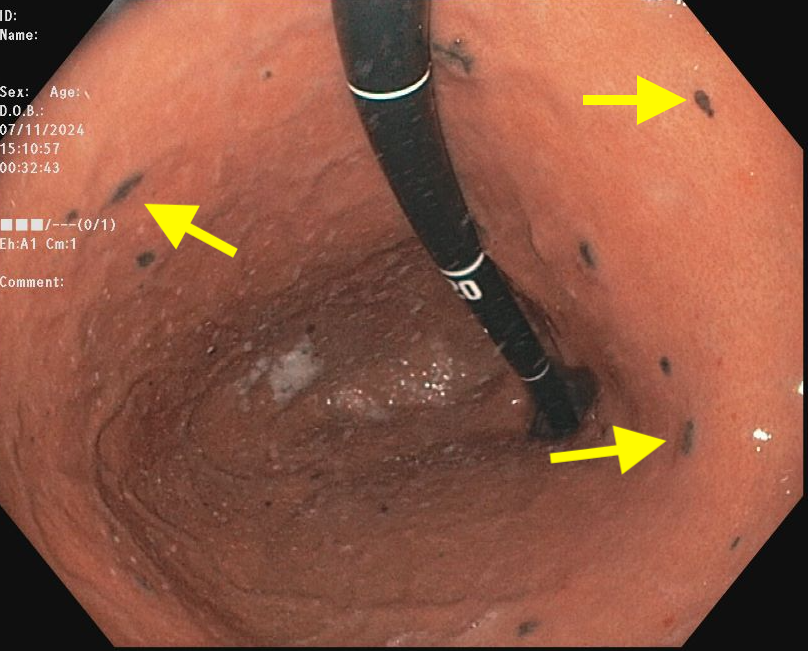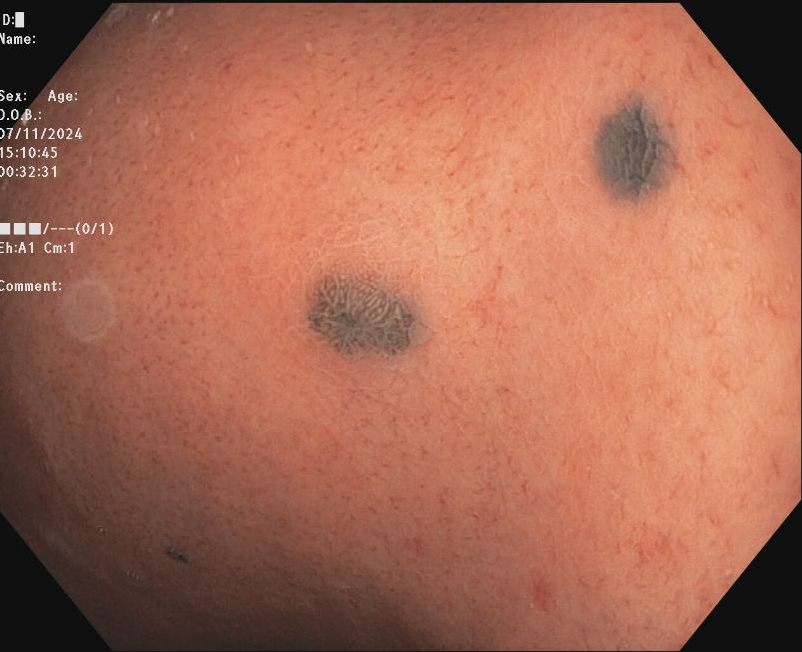Sunday Poster Session
Category: General Endoscopy
P0895 - A Rare Case of Gastric Metastases From Cutaneous Melanoma Presenting as Dyspepsia
Sunday, October 26, 2025
3:30 PM - 7:00 PM PDT
Location: Exhibit Hall
- MP
Mark Peicher, DO
University of New Mexico Hospital
Albuquerque, NM
Presenting Author(s)
Mark Peicher, DO1, Juan Gomez Cifuentes, MD2
1University of New Mexico Hospital, Albuquerque, NM; 2Presbyterian Health care, Albuquerque, NM
Introduction: Metastatic melanoma to the gastrointestinal (GI) tract is uncommon, with the stomach being an infrequent site of involvement. When present, it can be clinically silent or present with nonspecific symptoms, posing a diagnostic challenge.
Case Description/
Methods: 72-year-old male with a prior history of Stage IB cutaneous melanoma of the right shoulder, status post resection, presented with dyspepsia and mild post-prandial nausea. Esophagogastroduodenoscopy (EGD) revealed multiple 3–5 mm flat, polypoid, darkly pigmented lesions scattered throughout the stomach. Biopsies of the lesions were obtained. Histopathological examination demonstrated metastatic malignant melanoma in a background of mild chronic gastritis; testing was negative for Helicobacter pylori. The patient was subsequently referred to oncology for further management of metastatic disease.
Discussion: Although rare, gastric metastases from melanoma should be considered in patients with a history of melanoma who present with new upper GI symptoms. Endoscopic findings can vary, and diagnosis relies on histopathological confirmation. Early recognition is essential to guide appropriate oncologic management.

Figure: Multiple metastatic lesions

Figure: Closer look at metastatic lesions
Disclosures:
Mark Peicher indicated no relevant financial relationships.
Juan Gomez Cifuentes indicated no relevant financial relationships.
Mark Peicher, DO1, Juan Gomez Cifuentes, MD2. P0895 - A Rare Case of Gastric Metastases From Cutaneous Melanoma Presenting as Dyspepsia, ACG 2025 Annual Scientific Meeting Abstracts. Phoenix, AZ: American College of Gastroenterology.
1University of New Mexico Hospital, Albuquerque, NM; 2Presbyterian Health care, Albuquerque, NM
Introduction: Metastatic melanoma to the gastrointestinal (GI) tract is uncommon, with the stomach being an infrequent site of involvement. When present, it can be clinically silent or present with nonspecific symptoms, posing a diagnostic challenge.
Case Description/
Methods: 72-year-old male with a prior history of Stage IB cutaneous melanoma of the right shoulder, status post resection, presented with dyspepsia and mild post-prandial nausea. Esophagogastroduodenoscopy (EGD) revealed multiple 3–5 mm flat, polypoid, darkly pigmented lesions scattered throughout the stomach. Biopsies of the lesions were obtained. Histopathological examination demonstrated metastatic malignant melanoma in a background of mild chronic gastritis; testing was negative for Helicobacter pylori. The patient was subsequently referred to oncology for further management of metastatic disease.
Discussion: Although rare, gastric metastases from melanoma should be considered in patients with a history of melanoma who present with new upper GI symptoms. Endoscopic findings can vary, and diagnosis relies on histopathological confirmation. Early recognition is essential to guide appropriate oncologic management.

Figure: Multiple metastatic lesions

Figure: Closer look at metastatic lesions
Disclosures:
Mark Peicher indicated no relevant financial relationships.
Juan Gomez Cifuentes indicated no relevant financial relationships.
Mark Peicher, DO1, Juan Gomez Cifuentes, MD2. P0895 - A Rare Case of Gastric Metastases From Cutaneous Melanoma Presenting as Dyspepsia, ACG 2025 Annual Scientific Meeting Abstracts. Phoenix, AZ: American College of Gastroenterology.
